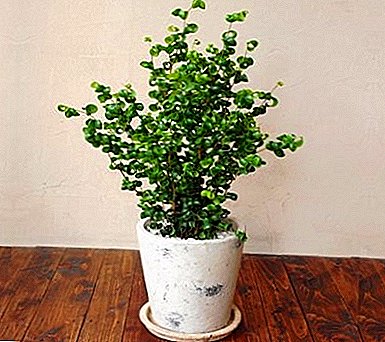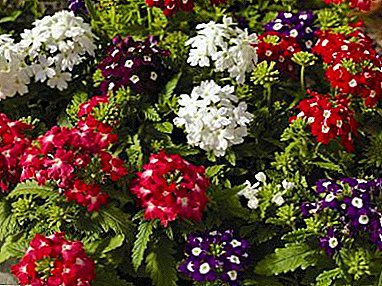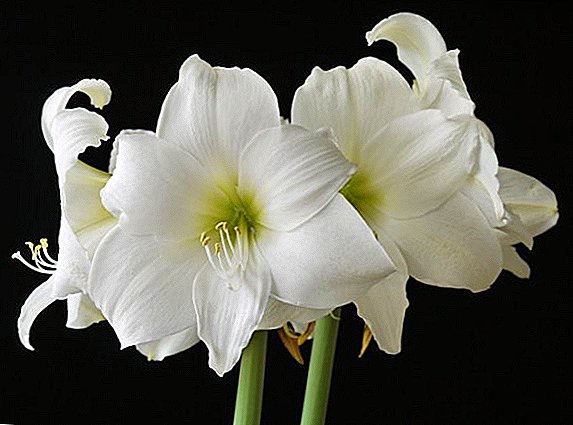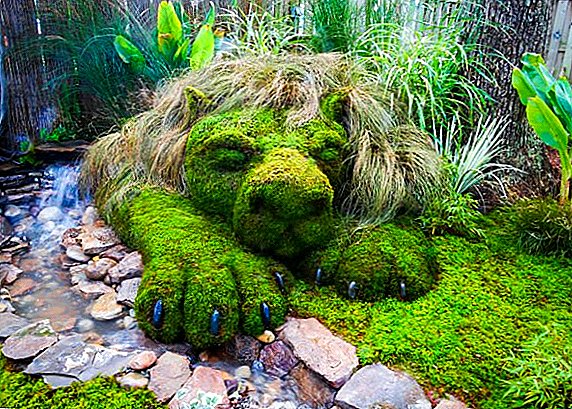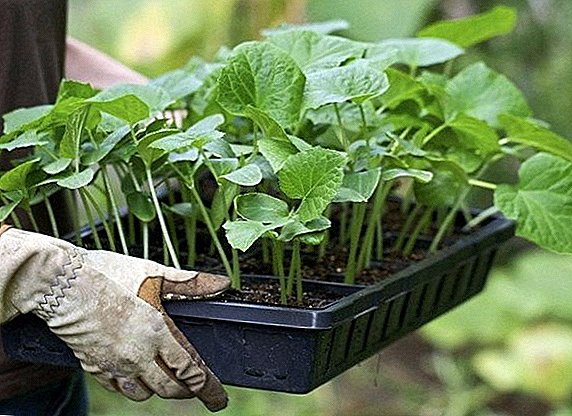
If you want to get a crop of vegetables all year round and at the same time not to pay special attention to environmental conditions, the greenhouse growing method is what you need. This article is devoted to the issues of planting cucumber seedlings in a greenhouse made of polycarbonate and other materials.
Signs for transplant
There are several true signs to determine when it is time to plant cucumbers in a greenhouse. The most important of them is the appearance on the stem of young seedlings of 3-4 true leaves, which usually occurs a month after sowing the seeds.
Did you know? The prickly thorns with which young cucumbers are littered are intended to remove excess moisture from the fruit. That is why in the morning on each of them you can see a drop of water.However, the experience of many gardeners shows that the smaller the seedling age, the better it tolerates the transplant and the better the survival rate. This phenomenon is due to the fact that the young underdeveloped root system is less susceptible to injury in the process of transplantation.

Experienced gardeners transplant seedlings in the phase of cotyledons and at the exit they get a survival rate that tends to 100%. This may be evidence that a carefully and carefully executed work can play a much more important role than the age of seedlings.
Popular varieties of cucumbers include: "Spring", "Meringue", "Siberian Festoon", "Hector F1", "Emerald Earrings", "Crispina F1", "Palchik", "True Colonel", "Masha f1".It is also important to remember that when cucumbers are grown in a polycarbonate greenhouse, they can be sown immediately at the place of final growth, in order to prevent the stress caused to the plants during the transplantation process. But at the same time it is very important to remember that the seedling method guarantees getting the crop earlier than when sowing seeds.
Conditions for growing cucumbers
The first aspect that will help answer the question of how to plant cucumbers correctly in a greenhouse is the principle of constructing a greenhouse. In the best way for its installation are suitable places with a flat surface or a small southern slope. It is extremely important that the site is protected from the negative influence of the north and north-east wind. 
It is necessary to attend to the construction of an irrigation system. In order to facilitate this process, it is recommended to choose the places where the groundwater lies at a depth of about 2 meters. It is also important to take care that the soil on which the greenhouse is planned to be built is sufficiently fertile and has properties suitable for creating various soil mixtures.
Did you know? During the heyday of Egyptian civilization, cucumbers were painted on tables for sacrifices and placed in the graves of especially distinguished pharaohs.The ideal size of the greenhouse to be constructed should be calculated so that the ratio of its volume and area is 2: 1. This greenhouse boasts complete isolation from the temperature regime prevailing outside.

The temperature inside the greenhouse in no case should not fall below 15-16 degrees, because its reduction can slow down the process of growth and development of seedlings, and if the temperature drops below 12 degrees, the seedlings can die at all.
It is possible to grow cucumbers not only in the greenhouse and open ground, but also by more non-standard methods: in buckets, plastic bottles, barrels, bags, on a windowsill or balcony, by hydroponics.
Soil preparation in the greenhouse
Advance preparation of quality soil mixture is one of the main guarantors of an impressive harvest. It is worth remembering that not every soil is equally well suited for the cultivation of cucumbers, among the essential qualities that it should possess, are the following:
- High fertility index.
- High water and breathability.
- Acidity should be close to neutral.
Many gardeners for growing cucumbers recommend soil mixture consisting of peat, field soil and humus in the ratio of 5: 2: 3. Adding to the mixture of sawdust coniferous trees also shows itself quite well. This additive in case of rotting, in addition to the release of the necessary heat, will also add some nitrogen-containing substances to the soil. 
Soil preparation for planting cucumbers is carried out as follows. After preliminary digging to a depth of 20–25 centimeters, disinfection is carried out using, for example, a 7% aqueous solution of copper sulphate. After processing, it is recommended to break large clumps of earth with a shovel or rake.
After a period of one month, various nutrients are added to the finished mixture, for example, potassium sulfate, superphosphate and ammonium nitrate. After that, you can proceed with the direct process of planting or seeding. 
Landing pattern
The scheme of planting cucumbers in the greenhouse is somewhat different from planting in the open field. For growing in greenhouse conditions, you can use various methods: planting on a flat surface, ridges or ridges. Practice shows that landing on ridges and ridges gives the best results.
Important! To organize beds or crests, it is necessary to dig a trench, the depth of which will be approximately 40 cm, after which fresh manure should be laid on its bottom. From above, everything must be filled with a fertile soil layer of 15 centimeters.There are no clear instructions on how far apart cucumbers should be planted in the greenhouse. However, experienced gardeners came to the conclusion that the best distance between rows is a distance of 40-70 cm, between tapes - about 75-90 cm, and in the same row between plants should be no less than 25-30 cm. Practice of growing cucumbers in greenhouses shows that for the successful growth and development of cucumbers over time will definitely need a backup. As its very convenient to use the trellis of twine and wire, which is usually set every 10-15 cm to a height of 1.5-2 meters. As the plant grows, it is gradually fixed to this structure. Tapestries will considerably simplify the process of harvesting, planting and planting foliar dressings.
Further care of seedlings
For the purpose of watering cucumbers, it is necessary to use only warm water, which should not be too hot. It is best to leave the container in a room where it will warm up to room temperature. In winter, watering is best done in the morning when the sun has already set. In summer and in hot weather, it is worth watering every other day, preferably before dawn or after sunset. 
A compulsory procedure is shallow loosening of the soil, which is designed to facilitate the process of air entering the plant’s root system and prevent its rotting.
Important! Remember that the cucumber has a rather superficial root system, and therefore the loosening should be done very carefully and no deeper than 5-7 centimeters.Airing of the greenhouse is a mandatory event during cool weather, the duration of such aeration should vary depending on temperature and is on average 30-70 minutes. With the onset of warm weather, the greenhouse should remain open throughout the day.
In order to feed cucumbers, it is recommended to use organic substances in the form of fermented diluted mullein, bird droppings, humus or infusions of various plants and herbs. Alternate such feeding with minerals, which are best suited for complex fertilizers designed specifically for pumpkin crops. The total number of dressings of cucumbers in one season should not exceed five. 
So, we hope that this article has helped you to clearly understand when and how to plant cucumbers in a greenhouse. Remember that only the greenhouse cultivation method in the state will provide you with a rich harvest throughout the year.





